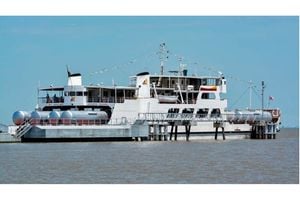Prime
Zimbabwe to deport Ugandan tourist found with sex toy

What you need to know:
- His lawyer, Knowledge Mabvuure, of the Zimbabwe Lawyers for Human Rights (ZLHR) said his client was in the custody of the immigration department awaiting deportation.
A Ugandan tourist, who spent 24 days in a Zimbabwean jail for possessing a sex toy is now awaiting deportation after he was acquitted of the charges.
Tom Ssekamwa, 24, was arrested outside a lodge in Masvingo, a city that is 292km south of the capital Harare, alongside Czech tourist Lucas Slavik on August 2.
The two were detained at the height of a government crackdown on dissent ahead of a regional summit that saw over 200 opposition and civil society activists being held for allegedly plotting to disrupt the event.
Mr Ssekamwa was acquitted this week by magistrate Isaac Chikura of the charge of criminal nuisance.
He was also cleared of charges of violating the Censorship Act for being found with a rubber male organ in his bag.
Prosecutors had said police had found the sex toy when they searched him.
In quashing both charges, the magistrate ruled that Mr Ssekamwa’s possession of the sex toy did not compromise the public or cause any nuisance.
Mr Chikura said he considered that the sex toy was found in the tourist’s bag and that he did not have any intention of displaying it in public.
His lawyer, Knowledge Mabvuure, of the Zimbabwe Lawyers for Human Rights (ZLHR) said his client was in the custody of the immigration department awaiting deportation.
“The challenge we have at the moment is that he needs to buy his own air ticket to leave the country, and his phone through which he can access his funds is still being held by the police,” Mr Mabvuure said.
“We are engaging the police to expedite the process.”
Government crackdown
Mr Ssekamwa’s colleague, Mr Slavik, was charged with publishing false statements with the intention to incite the public.
Prosecutors said he recorded a statement in a video saying there was no water or electricity in Masvingo.
The prosecution dropped another charge against Mr Slavik in which he was accused of being a criminal nuisance. He was subsequently acquitted and deported last week.
Most towns in Zimbabwe go without electricity for more than 18 hours at a time as the drought has reduced the flow of water for power generation at Kariba Dam, the country’s main source of hydropower.
Roseline Hanzi of the ZLHR, which provided free legal services to the tourists, said the arrests would tarnish Zimbabwe's image.
“A rather unfortunate incident that can have far reaching implications on the ranking of Zimbabwe as a safe tourism destination,” Ms Hanzi said.
“While the Czech Republic can explore international law rules, as they have an obligation to protect their nationals under international law, this could have been avoided.
“States have sometimes taken each other to the International Court of Justice when they feel that the rights of their citizens have been violated.”
More than 200 opposition supporters and civil society activists were arrested ahead of the 44th Southern African Development Community (SADC) Summit held in Harare for alleged crimes dating as far back as 2019.
The government said it had intelligence that the activists were planning to stage protests to disrupt the summit.
Christopher Mutsvangwa, spokesperson of the ruling Zanu PF party, recently told journalists that the remaining 100 activists can now be released as visitors who had come to Zimbabwe for the summit had since left.
“Those are deviants and they were dealt with properly. And we are very happy they failed (to stage protests). And they will never succeed,” Mr Mutsvangwa said.
President Emmerson Mnangagwa, who came to power after a 2017 military coup that toppled strongman Robert Mugabe, has beenaccused by his critics of being more authoritarian than his predecessor.




